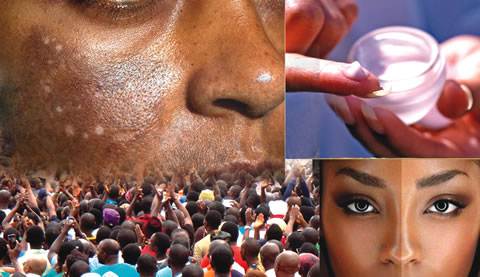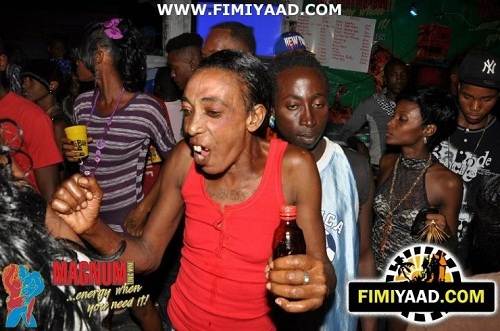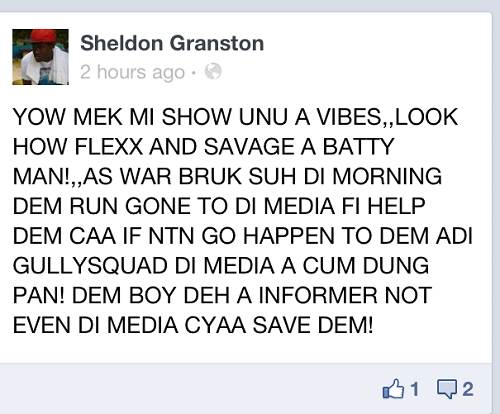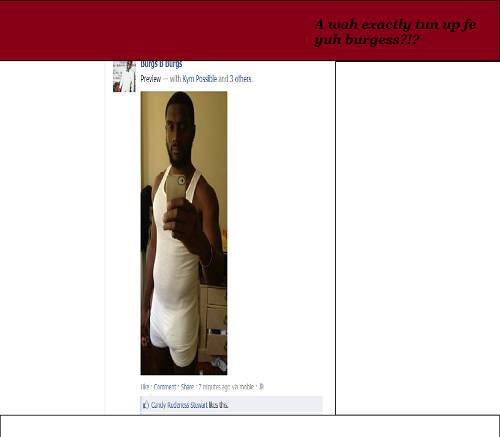SUMWHEY BEAT OUT JAMAICA WID DI BLEACHING
Jayne Augoye examines a World Health Organisation’s report classifying Nigerians as major users of skin lightening products
A World Health Organisation report on the danger of mercury in skin lightening soaps and creams has revealed that over 77 per cent of Nigerians use such products on a regular basis.
The report, published this month by the organisation on its website, further shows that it is followed by Togo with 59 per cent; South Africa, 35 per cent; and Mali, 25 per cent.
In a similar vein, the organisation has issued a warning against skin lightening soaps, creams and cosmetics like eye makeup, cleansing products and mascara, saying they could be containing mercury.
It cites the adverse effects of inorganic mercury — a common ingredient found in skin lightening soaps and creams. The effects include kidney damage, reduction in the skin resistance to bacterial and fungal infections, anxiety, depression, psychosis and peripheral neuropathy.
Others are skin rashes, swelling of the skin, irritation, seizures, numbness, pain tremors and memory loss. According to WHO, once the chemicals get absorbed into the skin and enter the blood stream, the complications are worse.
Carolyn Vickers of WHO Chemical Safety Department says, “Mercury in soaps and creams eventually enters waste water and then enters the food chain as highly toxic methyl mercury.
“The mercury enters environment, where it becomes methylated, and enters the food chain as highly toxic methylmercury in fish. Pregnant women who consume fish containing methylmercury transfer the mercury to their foetuses that can later result in neurological deficits in children,” the report states.
It adds that lightening soaps and creams are commonly used in some African and Asian nations and dark-skinned populations in Europe and North America. Mercury salts work by inhibiting the formation of melanin, resulting in a lighter skin tone.
It is also reported that some women use these products for as long as 20 years. The number is growing by the day. Ehowhow.com says “ It is generally believed that this practice is influenced by deep racial inferiority, ignorance of identity or a crisis of identity but it is important to note that there is more to it than this. For some of the women, skin lightening satisfies their need for attention, their desire for beauty as seen in magazines where models and celebrities have light colored skin. It can be seen as perpetuating the colonial belief that being lighter is better.”
In many countries, this deadly substance has been banned.
“Some manufacturers are no longer using mercury as a preservative in mascara and eye makeup cleansing products as a result of consumer pressure. However, most jurisdictions still allow the sale of makeup products containing mercury compounds. The soaps contain approximately one to three per cent mercury iodide, and the creams are composed of one to 10 per cent mercury ammonium. It is imperative to check for mercury content on the packaging of the soaps, creams or other cosmetics before getting hooked to them,” the report says.
Part of the consolation, however, is that despite a deliberate ploy by some manufacturers to conceal the presence of mercury in their products, there are a few ways by which consumers can confirm when in doubt.
According to WHO, the amount or concentration of mercury in a product may be labelled on the packaging or in the ingredient list. Names to look for include mercury, Hg, mercuric iodide, mercurous chloride, ammoniated mercury, amide chloride of mercury, quicksilver, cinnabaris, hydrargyri oxydum rubrum (mercury oxide) and mercury iodide.
Skin lightening products are manufactured in many countries like China, the Dominican Republic, Lebanon, Mexico, Pakistan, the Philippines, Thailand, and the USA.
These products come in different forms, including soaps and creams; the soap is often sold as “antiseptic soap”. These products are supposed to be applied to the skin to dry overnight. Women use the soap to wash their hair, arms or face or their entire body. Products with very high levels of mercury contamination look grey or cream coloured.
When the product manual reads, “Directions to avoid contact with silver, gold, rubber, aluminum and jewellery’’, this may indicate the presence of mercury. However, it is important to note that companies selling products that contain mercury do not always list it as an ingredient.
http://www.punchng.com/feature/nigerians-top-users-of-bleaching-creams-who/
WATER AND THE HOLY SPIRIT- GOODMORNING
Water and the Holy Spirit
Throughout the Word of God, water is a symbol, a “type,” of the spirit of God, and is often used analogously to represent holy spirit, that is, the divine nature and power of God. In Scripture, God is also known as “the Holy Spirit.” [1] In Jeremiah 2:13, for example, God refers to Himself as a “spring of living water” (see also Isa. 44:3 and 4). Think about water and what it means to you. Water is essential to life—we die without it. The average person can go about 60 days without food before he starves to death, but one can go only about three days without water, because it is so vital. In fact, the human body is mostly water. Whenever someone forsakes God, the spring of living water, he has no choice but to do what Jeremiah 2:13 says, to hew out his own broken cistern, which is always one that simply “won’t hold water.” We see that just as actual water gives life physically and is integral to one’s physical life, so spiritual water (the gift of holy spirit) gives life spiritually.
Consider this same parallel between water and the spirit of God in the following verses, where Jesus is speaking to a woman he met at a local well:
John 4:13 and 14
(13) Jesus answered, “Everyone who drinks this water will be thirsty again,
(14) but whoever drinks the water I give him will never thirst. Indeed, the water I give him will become in him a spring of water welling up to eternal life.”
In John 6, we find another pertinent record illustrating the analogous relationship between water and the holy spirit. I have taken a bit of literary license in summarizing verses 1-34: Jesus had been invited to a company picnic, only to discover that all 5,000 employees had forgotten their lunches. So he put up a big banner that read, “Free Food – All You Can Eat!” He then fed them delicious fish sandwiches. Later, when they got hungry again, they followed him to the other side of the lake for more free food. So Jesus, as his manner was, then began to teach them an abstract, spiritual truth that he figuratively connected to the concrete, physical acts of eating and drinking. John 6:35 is a key verse in the record, and it reads: “Then Jesus declared, ‘I am the bread of life. He who comes to me will never go hungry and he who believes in me will never be thirsty.’” Clearly, he is equating eating and drinking with believing his words. That kind of figurative language is still used today when we say that someone is “eating up” what another is saying or “drinking in” the words of a speaker.
Like his Father, Jesus is also a fountain of living waters, and he stated just that in the next chapter of John.
John 7:37-39 [Author’s translation, with punctuation and capitalization corrected]
(37) On the last and greatest day of the Feast, Jesus stood and said in a loud voice, “If anyone is thirsty, let him come to me and drink,
(38) whoever believes in me, as the Scripture has said, streams of living water will flow from within him [the Messiah].”
(39) By this he meant the spirit, whom [which] those who believed in him were later to receive. Up to that time, the spirit had not been given, since [because] Jesus had not yet been glorified.
Did Jesus stand up and mutter? No, he wanted everyone to hear his earthshaking pronouncement, so he shouted over the din of the merry revelers: “Yo! Excuse me! I am the eternal drinking fountain. If you’re thirsty, come to me and drink, by believing in me.” That is exactly the point he made in John 6 when he equated drinking with believing his words. In John 7, he proved it by referring to the Old Testament, of which he himself is the subject. The promised Messiah was the one who God, the eternal fountain, the spring of living water, sent to give drink to a dying world. And what is that “liquid” refreshment? As verse 39 emphasizes, it is the holy spirit of God, again analogously referred to as water.
The holy spirit would be given to all who believe in Jesus as Lord, but Jesus could not do this “pouring out” until after he was glorified, that is, raised from the dead and exalted to the right hand of God. At his exaltation, Jesus was given the holy spirit of God “without measure” (John 3:34 – NASB) so that he could give it to others who believed in him. For the Church, Jesus first “poured out” the holy spirit of God on the Day of Pentecost as recorded in Acts 2. In this classic verse, Peter is speaking to the amazed crowd assembled in the Temple on that historic day, and it is most significant that he also compares the gift of holy spirit to liquid:
Acts 2:33
“Exalted to the right hand of God, he [Jesus] has received from the Father the promised Holy Spirit [holy spirit] and has poured out [like water] what you now see and hear.”
When John the Baptist came as a forerunner to the Messiah, many people asked him if he were the Christ. Look closely at his reply:
Luke 3:16
John answered them all, “I baptize you with water. But [in contrast] one more powerful than I will come, the thongs of whose sandals I am not worthy to untie. He will baptize you with the Holy Spirit [no article “the”: holy spirit, the gift] and with fire.”
While John was baptizing people in the river Jordan, Jesus himself showed up, and John baptized him. Why was Jesus baptized in water? First, because he was a Jew living under the Mosaic Law, and water baptism was still pertinent to him. As Jesus said in Matthew 3:15 when John was humbly reluctant to baptize him, “Let it be so now; it is proper for us to do this to fulfill all righteousness.” That is, all of God’s requirements for the Messiah were fulfilled in Jesus, who by his baptism symbolically identified with all men’s sin and need for cleansing, and became our substitute. [2]
It is also significant that at the same moment when John baptized Jesus with water, God “baptized” His Son with holy spirit in the form of a dove that descended upon him. Thus, in Jesus Christ, both baptisms interfaced, showing the transition between the old and the new that would take effect on the Day of Pentecost when the Church began. Accompanied by God’s no doubt “reverb-ial” voice from heaven affirming Jesus’ identity and His love for His Son, this event marked the beginning of Jesus’ earthly ministry.
Many believe that John the Baptist was the first to baptize in water, but this is clearly not the case. If so, John would have been pretty lonely standing in the Jordan River waiting on the Israelites to come and be baptized. If the Israelites had not already known about water baptism, they would have walked away after hearing him preach and said, “What the heck was that John guy talking about, anyway? I know what ‘repent’ means, but what is this ‘baptism’ stuff?” No, as Jews, they were very familiar with water baptism, and that is why they flocked to the river. That is also why, when the priests and Levites questioned John, they did not act surprised, as if baptism were a new ritual.
Hebrews 9:10 mentions “various ceremonial washings” in the Law, and the Greek word for “washings” there is “baptisms.” God could have easily used one of several other Greek words, such as pluno, which is used of washing inanimate things; nipto, used of washing a part of the body; or louo, which means “to bathe” or “to wash the entire body.” Instead, He chose “baptisms” to refer to the Old Testament washings.
A careful reading of the Old Testament reveals various types of washings for both Israelites and proselytes to Judaism. Exodus 30:17-21 mentions the bronze basin that was placed between the door of the Tabernacle and the altar so the priests could wash their hands and feet, thus ceremonially purifying themselves so they would not die in the presence of God. Water baptism under the Law was also representative of the one baptized going down into the grave and then being re-born unto life.
According to Exodus 40:12, Aaron and his sons were brought to the Tabernacle and washed with water. When Solomon built the Temple in Jerusalem, he had a basin cast of bronze that was so large the Bible calls it “the Sea.” Scholars estimate that it held about 12,000 gallons of water and was a source of water for bathing, which was sometimes done by pouring the water over the man, and sometimes by putting it in a different container (2 Chron. 4:6).
The Mosaic Law was full of regulations about washing. There were many different things that a person could do that would make him unclean, and often the Law said that he then had to wash in water in order to re-enter the congregation. Compare Leviticus 14:9; 15:7,8,11,13,21,22,27; 16:26,28, and note the following similar verses:
Leviticus 17:15 and 16
(15) “‘Anyone, whether native-born or alien, who eats anything found dead or torn by wild animals must wash his clothes and bathe with water, and he will be ceremonially unclean till evening; then he will be clean.
(16) But if he does not wash his clothes and bathe himself, he will be held responsible.’”
In the sense of getting rid of uncleanness, bathing in water, besides being a sanitary regulation, had some typological significance. The same was true of John’s baptism – the water was symbolic of the rinsing off of sin and of showing one’s desire to enter the Kingdom of God. Also, the Levites were sprinkled with water before they started ministering in the Tabernacle (Num. 8:6 and 7). The Law even had a special water of purification that was used in certain cases of uncleanness (e.g., Num. 19).
By the time of John the Baptist, there were ritual washing pools all over Israel. Today many of these pools can be seen in the archeological excavations throughout Israel, with good examples at Qumran, New Testament Jericho, and Jerusalem itself. It is believed that the Jews of the time of Christ required a new convert to be water baptized. Hasting’s Dictionary of the Bible says, “A stranger who desired to become a Proselyte of the Covenant, or of Righteousness, i.e., in the fullest sense an Israelite, must be circumcised and baptized, and then offer a sacrifice.” It goes on to say that the person was taken “to a pool, in which he stood up to his neck in water, while the great commandments of the Law were recited to him. These he promised to keep. Then a benediction was pronounced and he plunged beneath the water, taking care to be entirely submerged.” [3]
Here is another telling quote regarding the prominence of ritual washings in Judaism:
Ritual immersion was important enough to the Jews that the Mishnah, which is the first section of the Talmud and collected from early oral interpretations of the Scripture, devotes an entire tractate to mikva’ot [the plural of mikveh], which were ritual immersion pools. Among other things, it describes how much water a mikveh should contain, how to stop a leak, and even places the “living water” that the mikveh contained into six grades of excellence or acceptability. The water in the mikveh was to come “by the hand of heaven” and not “by the hand of man,” so it had to be rainwater (gravity fed from rooftops was fine), springs, etc. Drawing water from cisterns to fill the mikveh was not acceptable, but in an interesting twist, since the Rabbis declared that mikveh water had the power to purify, small amounts of cistern water could be added to the “living water” to keep the mikveh full, and it was declared purified by the water already in the mikveh. The beauty of baptizing, as John did, in the Jordan River, was that there would never be any disputes about whether or not the water was Levitically acceptable. [4
HAYYYYYYYYY GAY RIGHTS ARE NOT CIVIL RIGHTS!
Southern Baptists: Gay Rights Not Civil Rights
By TRAVIS LOLLER 06/20/12 07:50 PM ET
Southern Baptist Convention voted that gay rights are not civil rights
NEW ORLEANS — A day after electing their first African-American president in a historic move that strives to erase its legacy of racism, Southern Baptists passed a resolution opposing the idea that same-sex marriage is a civil rights issue.
Thousands of delegates at the denomination’s annual meeting in New Orleans on Wednesday were nearly unanimous in their support for the resolution that affirms their belief that marriage is “the exclusive union of one man and one woman” and that “all sexual behavior outside of marriage is sinful.”
The nation’s largest Protestant denomination is attempting to broaden its appeal beyond its traditional white Southern base. At the same time, leaders said they feel it is important to take a public stand on their opposition to same-sex marriage.
The resolution acknowledges that gays and lesbians sometimes experience “unique struggles” but declares that they lack the “distinguishing features of classes entitled to special protections.”
“It is regrettable that homosexual rights activists and those who are promoting the recognition of `same-sex marriage’ have misappropriated the rhetoric of the Civil Rights Movement,” the resolution states.
Another resolution passed on Wednesday is intended to protect religious liberty. It includes a call for the U.S. Justice Department to cease efforts to overturn the Defense of Marriage Act and for the Obama administration to ensure that military personnel and chaplains can freely express their religious convictions about homosexuality.
It also condemns the administration’s mandate requiring religiously affiliated institutions, but not houses of worship, to provide contraceptive coverage for their employees.
Leaders of several other faiths and Christian denominations, especially Roman Catholics, have also organized and filed lawsuits against Obama administration policies that they see as threatening religious expression.
The Rev. Dwight McKissic, pastor of Cornerstone Baptist Church in Arlington, Texas, was one of the authors of the gay marriage resolution.
“It’s important to sound the alarm again, because the culture is changing,” he said in an interview after the vote.
McKissic, who is black, said it was “an unfair comparison” for gays to equate same-sex marriage with civil rights because there is not incontrovertible scientific evidence that homosexuality is an innate characteristic, like skin color.
“They’re equating their sin with my skin,” he said.
David W. Key Sr., director of Baptist Studies at Emory University’s Candler School of Theology, said that as gays and lesbians become accepted in the larger American society, the Southern Baptist Convention is trying to separate itself from some of the more hateful rhetoric while still staying true to its beliefs.
The resolution includes a statement that the SBC stands against “any form or gay-bashing, whether disrespectful attitudes, hateful rhetoric, or hate-incited actions.”
But even with those disclaimers, Key said statements like this could hurt evangelism because they are likely to be objectionable to many people who are “not necessarily affirming, but also not rejecting” of gay rights issues.
Key said the Southern Baptists have continued to be outspoken on issues regarding gays and lesbians where other denominations with similar beliefs have not made the same type of public statements. He noted the SBC’s previous eight-year boycott of The Walt Disney Co. for its gay-friendly policies.
The civil rights resolution comes at the same time the 16-million strong Nashville-based denomination is taking stands in other areas that will help it reach out to new members.
The election of the Rev. Fred Luter Jr. on Tuesday as the first African American president of the SBC was hailed as historic by denomination leaders who see it as a sign that Southern Baptists have truly moved beyond a divisive racial past.
In a news conference after the vote, Luter said he doesn’t think his election is some kind of token gesture.
“If we stop appointing African-Americans, Asians, Hispanics to leadership positions after this, we’ve failed,” he said. “… I promise you I’m going to do all that I can to make sure this is not just a one-and-done deal.”
Delegates to the annual meeting also voted to adopt an alternative name for churches that feel the “Southern Baptist” title could be a turn-off to potential believers.
Supporters of the optional name “Great Commission Baptists” argued it would help missionaries and church planters to reach more people for Christ.
And the Southern Baptists have been less provocative on gay issues than they once were. The denomination ended its Disney boycott in 2005 and this year, as outgoing President Bryant Wright passed the gavel to Luter, the new president asked about Wright’s plans.
“I’m going to Disney World!” Wright said.
DI SKIRTING STAWT
-
Battyman flexx stop Cal me private anytime we buk up again a war pussy stop bawl cause yo Sey yo bad n a fret n a tell lie memba the street see unuh run up pon down like antz
****RULES**** 1. Debates and rebuttals are allowed but disrespectful curse-outs will prompt immediate BAN 2. Children are never to be discussed in a negative way 3. Personal information eg. workplace, status, home address are never to be posted in comments. 4. All are welcome but please exercise discretion when posting your comments , do not say anything about someone you wouldnt like to be said about you. 5. Do not deliberately LIE on someone here or send in any information based on your own personal vendetta. 6. If your picture was taken from a prio site eg. fimiyaad etc and posted on JMG, you cannot request its removal. 7. If you dont like this forum, please do not whine and wear us out, do yourself the favor of closing the screen- Thanks! . To send in a story send your email to :- [email protected]







Recent Comments